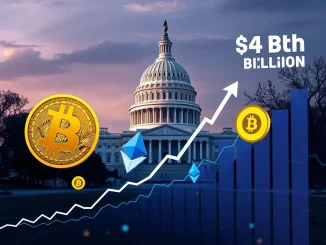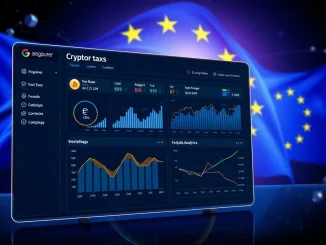
The world of cryptocurrency is constantly evolving, and so is the regulatory landscape surrounding it. A significant development currently unfolding involves the CFTC crypto oversight role, which is undergoing changes that could have a lasting impact on digital asset markets in the United States.
The Commodity Futures Trading Commission (CFTC) is experiencing a period of transition. Several commissioners are reportedly departing the agency, creating a notable flux in its leadership structure. This comes at a crucial time when Congress is actively working on legislation aimed at expanding the agency’s authority over the crypto space.
What’s Happening with CFTC Leadership?
Reports indicate a wave of departures among CFTC commissioners. While specific names and timelines can shift, the general trend points to a significant turnover at the top. This isn’t just administrative churn; it raises questions about the agency’s capacity and direction, especially as its potential responsibilities grow.
Here’s a breakdown of the situation:
- Multiple commissioners are reportedly leaving their posts.
- These departures create vacancies on the commission, which typically has five members.
- Filling these seats requires presidential nominations and Senate confirmation, a process that can take time.
- The timing coincides directly with increased legislative focus on crypto regulation.
This situation means the agency tasked with potentially taking on significant new responsibilities in the crypto market might be operating with fewer commissioners, at least temporarily. This could impact the speed and decisiveness of regulatory actions.
Congressional Push for Expanded CFTC Crypto Oversight
Simultaneously, lawmakers in Congress are advancing proposals to give the CFTC more explicit authority over certain aspects of the crypto market, particularly digital assets deemed commodities. Bitcoin and Ethereum, for example, have often been discussed in this context.
Key aspects of this legislative push include:
- Granting the CFTC clear jurisdiction over crypto commodity markets.
- Establishing frameworks for registering and overseeing crypto trading platforms.
- Aimed at providing regulatory clarity and market integrity.
The goal is to bring more clarity and structure to the market, moving away from the current state where the lines between the CFTC’s and the SEC’s jurisdiction over various digital assets are often debated.
Could This Lead to More Pro-Crypto Leadership?
Interestingly, some former CFTC chairs and market observers suggest that this period of leadership flux, combined with the push for expanded oversight, could ultimately pave the way for a commission with a more favorable stance towards the crypto industry. This perspective was highlighted in a report by The Block.
Why might this be the case?
- New Appointments: As vacancies are filled, the administration has the opportunity to nominate individuals with perspectives informed by the growth and potential of digital assets.
- Focus on Commodities: If the CFTC’s role is specifically expanded regarding crypto commodities, future commissioners might be selected based on their understanding of and approach to these markets, potentially favoring commodity-like regulation over stricter securities frameworks.
- Industry Engagement: The process of drafting and implementing new rules requires significant industry input, potentially leading to regulations better tailored to the unique nature of crypto.
While a delay in filling seats could initially slow things down, the long-term outcome of new appointments could indeed shift the ideological balance of the commission towards a more accommodative view of digital asset innovation, particularly within the commodity framework.
Navigating the US Crypto Regulation Landscape
This situation at the CFTC is a critical piece of the broader puzzle of US crypto regulation. The division of authority between the CFTC and the Securities and Exchange Commission (SEC) has been a major point of uncertainty for the industry.
Currently:
- The SEC primarily oversees assets deemed securities.
- The CFTC oversees commodities and derivatives markets.
- Many digital assets exist in a gray area, leading to enforcement actions and calls for legislative clarity.
Expanded Commodity Futures Trading Commission authority, coupled with new leadership, could potentially clarify which regulator has primary oversight for specific types of digital assets, offering much-needed certainty for businesses and investors.
What Does This Mean for the Crypto Community?
For those involved in the crypto market, this period presents both challenges and opportunities:
- Uncertainty: The transition period with fewer commissioners and ongoing legislative debate creates near-term uncertainty about future rules.
- Potential for Tailored Rules: If the CFTC takes the lead on crypto commodities, the resulting regulations might be more suitable for the technology and market structure compared to applying existing securities laws directly.
- Advocacy is Key: The industry has an opportunity to engage with lawmakers and potential nominees to advocate for sensible, clear, and innovation-friendly regulations.
Watching who is nominated to fill the vacant CFTC seats will be crucial, as their backgrounds and stated views on digital assets will signal the potential future direction of the agency’s approach to crypto.
Conclusion: A Pivotal Moment for CFTC Crypto Oversight
The current situation at the CFTC—marked by commissioner departures and the prospect of expanded authority from Congress—represents a pivotal moment for CFTC crypto oversight and the future of US crypto regulation. While the immediate future may involve some uncertainty due to leadership transitions and potential delays in appointments, the possibility remains that these changes could ultimately lead to a commission leadership more aligned with fostering innovation within a clear regulatory framework for digital assets deemed commodities. The crypto industry and market participants should closely monitor these developments, as they will undoubtedly shape the operational and compliance landscape for years to come.



